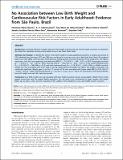No Association between Low Birth Weight and Cardiovascular Risk Factors in Early Adulthood: Evidence from São Paulo, Brazil

View/
Author
Gomes, Filumena Maria
Subramanian, S. V.
Escobar, Ana Maria de Ulhôa
Valente, Maria Helena
Grisi, Sandra Josefina Ferraz Ellero
Brentani, Alexandra
Published Version
https://doi.org/10.1371/journal.pone.0066554Metadata
Show full item recordCitation
Gomes, Filumena Maria, S. V. Subramanian, Ana Maria de Ulhôa Escobar, Maria Helena Valente, Sandra Josefina Ferraz Ellero Grisi, Alexandra Brentani, and Günther Fink. 2013. “No Association between Low Birth Weight and Cardiovascular Risk Factors in Early Adulthood: Evidence from São Paulo, Brazil.” PLoS ONE 8 (6): e66554. doi:10.1371/journal.pone.0066554. http://dx.doi.org/10.1371/journal.pone.0066554.Abstract
Background: A growing literature suggests that low birth weight increases the risk of poor health outcomes in adulthood. We tested this hypothesis among young adults living in São Paulo State, Brazil. Methods and Findings: To identify the effects of low birth weight on young adulthood outcomes, a medical assessment of 297 individuals born between 1977 and 1989 was conducted at a primary care unit in São Paulo State, Brazil. We analyzed body mass index (BMI), waist-hip ratio, blood pressure, fasting glucose and total cholesterol levels using linear and logistic regressions. Low birth was negatively associated with BMI (β = −2.0, 95% CI: −3.69, −0.27, p = 0.02), fasting glucose levels (β = −1.9, 95% CI: −3.9, −0.07, p = 0.05), waist-hip ratio (β = −0.03, 95% CI: −0.07, −0.01, p = 0.10), systolic blood pressure (β = −3.32, 95% CI: −7.60, 0.96, p = 0.12), and total cholesterol levels (β = −3.19, 95% CI: −16.43, 10.05, p = 0.636). Low birth weight was also associated with lower odds of young adults being overweight and obese, but neither association was statistically significant. Weight gain in the first 12 months of life was associated with higher adult BMI (β = 0.79, 95% CI: −0.0455, 1.623, p = 0.064) and blood pressure (β = 2.79, 95% CI: 0.22, 5.35, p = 0.034). No associations were found between low birth weight and early life (catch-up) growth. Conclusions: Low birth weight was not associated with poor health outcomes among young adults in Brazil. These results appear inconsistent with the original Barker hypothesis, but will need to be corroborated in larger samples with longer follow-ups to allow a more general evaluation of the validity of the hypothesis in low and middle income countries.Other Sources
http://www.ncbi.nlm.nih.gov/pmc/articles/PMC3684573/pdf/Terms of Use
This article is made available under the terms and conditions applicable to Other Posted Material, as set forth at http://nrs.harvard.edu/urn-3:HUL.InstRepos:dash.current.terms-of-use#LAACitable link to this page
http://nrs.harvard.edu/urn-3:HUL.InstRepos:11708582
Collections
- SPH Scholarly Articles [6362]
Contact administrator regarding this item (to report mistakes or request changes)


